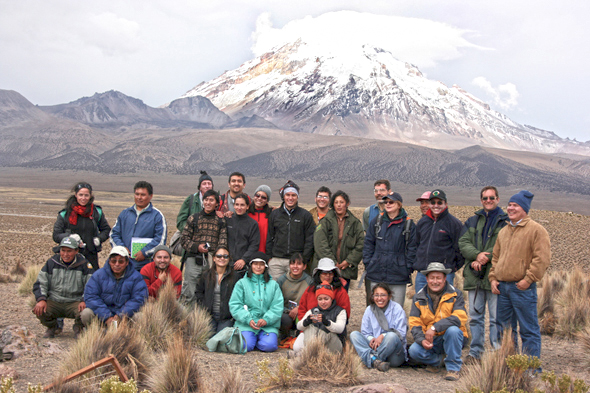Bolivia and Ecuador are leading the way in developing rights for Mother Earth [3 May 2011 | Peter Boyer]
In Hobart in November 2007, the Tasmanian Symphony Orchestra gave the world-premiere performance of Endling, a work by Sydney composer Andrew Schultz.

Delegates from Andean countries in the Bolivian Andes during a 2007 workshop of the Global Observation Research Initiative in Alpine Environments (GLORIA) on better long-term observation in the Andes. PHOTO: GLORIA (http://www.gloria.ac.at/?a=49)
In spare, haunting tones rendered by strings, horns and drums, Endling powerfully evoked the sense of loneliness and bereavement that accompanies the extinction of species. (An endling is the last surviving individual of a species.)
I can’t offer you the musical experience, but what Schultz wrote about Endling conveys some of this sense of loss, arising as it did “from a feeling of immense regret and sorrow about all that has been lost from the face of the earth.”
“Beautifully adapted plants, animals and societies that are no more, have been replaced by what?” he asks. “A world of ugliness, material obsession, perpetual and pointless change, and the hideous ‘marketing’ of everything from a symphony to a child’s smile.”
We put up with this “world of ugliness” because it’s a shield — even if only a transitory one — from the nasty, brutish world “out there”. But far from protecting our civil life, this shield of technology now threatens its future by slowly destroying the natural systems that underpin it.
We recognised long ago that we must somehow stop this destruction. The result has been piecemeal government measures to do such things as curb air and water pollution, end wholesale forest clearing and set aside nature reserves. But we lack a big-picture statement.
In 1948, when the world’s nations wanted a legal basis for acting against misbehaving tyrants, they agreed that they had to safeguard their citizens’ rights to equal treatment under law, to elect leaders, to assemble freely and so on. That was the Universal Declaration of Human Rights.
It’s long past time we had a Universal Declaration of Nature’s Rights — the sort of thing envisaged by Christopher Stone, a US law professor who in a famous 1972 paper called “Should trees have standing?” envisaged legally-sanctioned rights for natural objects and areas.
Stone’s work helped to shape US judicial thinking about the environment during the 1970s and 1980s, and in the longer term established the notion of the rights of nature as something that governments and the law should think about. But that’s about as far as it got.
Some peoples and their governments have decided to go further. In September last year, two-thirds of Ecuadorian voters agreed to a new national constitution enshrining “the rights of nature” to “maintain and regenerate its vital cycles, structure, functions and its processes in evolution.”
Ecuador was joined in late 2010 by another Andean government —impoverished, landlocked Bolivia. At the UN climate summit in Mexico, Bolivia’s president, Evo Morales, expressed a widespread view among his countrymen, and many people across Latin America, that Mother Nature needed due legal acknowledgment as the basis of everything that we are and do.
Morales’s calls for an International Court of Climate Justice and an immediate 50 per cent cut in carbon emissions were laughed off as the rantings of a low-born populist leader with connections to the distasteful socialist regimes in Venezuela and Cuba.
But five months on, the promise to bring nature within the ambit of Bolivia’s law is all but agreed, with a comfortable majority of the country’s elected representatives in favour. The result is the astonishing “Mother Nature Law”.
Under the new law, Mother Earth is held to be sacred in accordance with indigenous beliefs, and humans are a part of nature’s complex and dynamic life systems. An “Ombudsman of Mother Earth” will be charged with safeguarding nature’s right to diversity, to be protected from destruction, and to be free of contamination.
The support of the peoples of Bolivia and Ecuador for nature to get real legal status didn’t happen by chance. Unlike us, they feel no need to debate the existence of climate change, or to call on the views of scientists. The evidence is right in front of their eyes. They live with it every day.
Rising temperatures and extended drought in the Andes foothills since the 1970s have caused crops to be decimated. Bean production in some parts of Bolivia has been cut by 90 per cent. Melting glaciers are seriously threatening both urban and rural water supplies.
Plants and animals are suffering infections from which colder conditions once gave them immunity, and rural settlements in Bolivia’s Andean foothills are becoming ghost towns as people are forced to leave because they can’t produce enough food to survive.
Needless to say, the actions of various South American countries to assert natural and community rights over those of private corporations are being hotly disputed abroad. While the United States has been careful not to criticise the ethics of the new law, it’s joined other countries in condemning Bolivia for the law’s perceived threat to international commerce.
We, too, might scoff at the gall of these tinpot regimes in thinking they can overturn centuries of mercantile tradition with a stroke of a legislator’s pen. They can’t, of course, but these trailblazers are alerting us to a truth that sooner or later we’ll all have to acknowledge.
We are, in fact, an inseparable part of nature.
